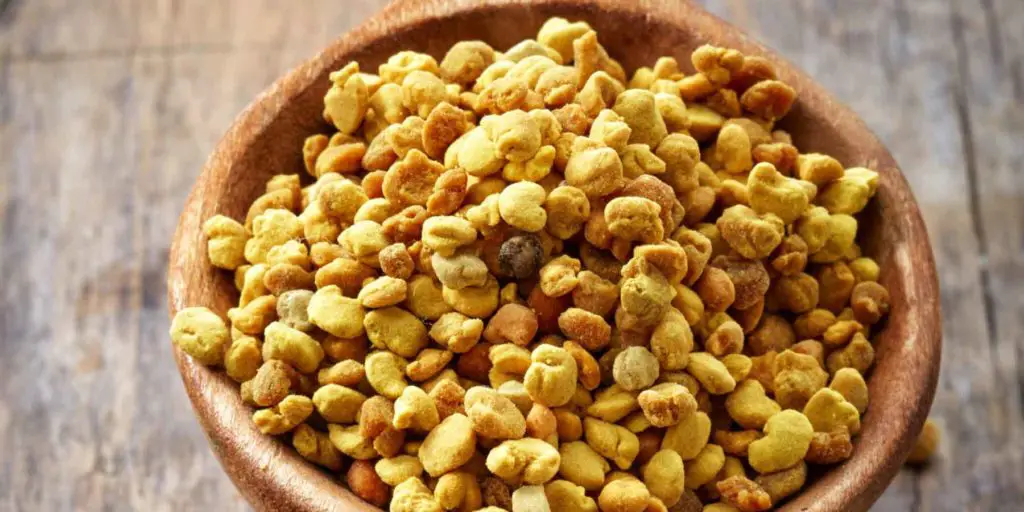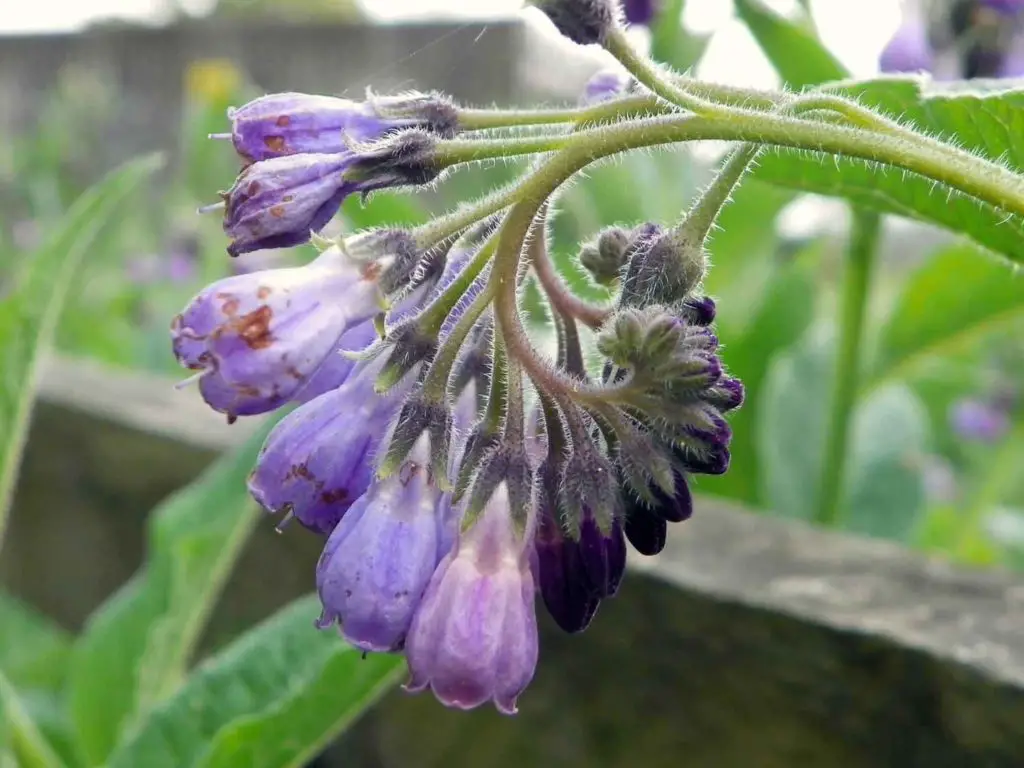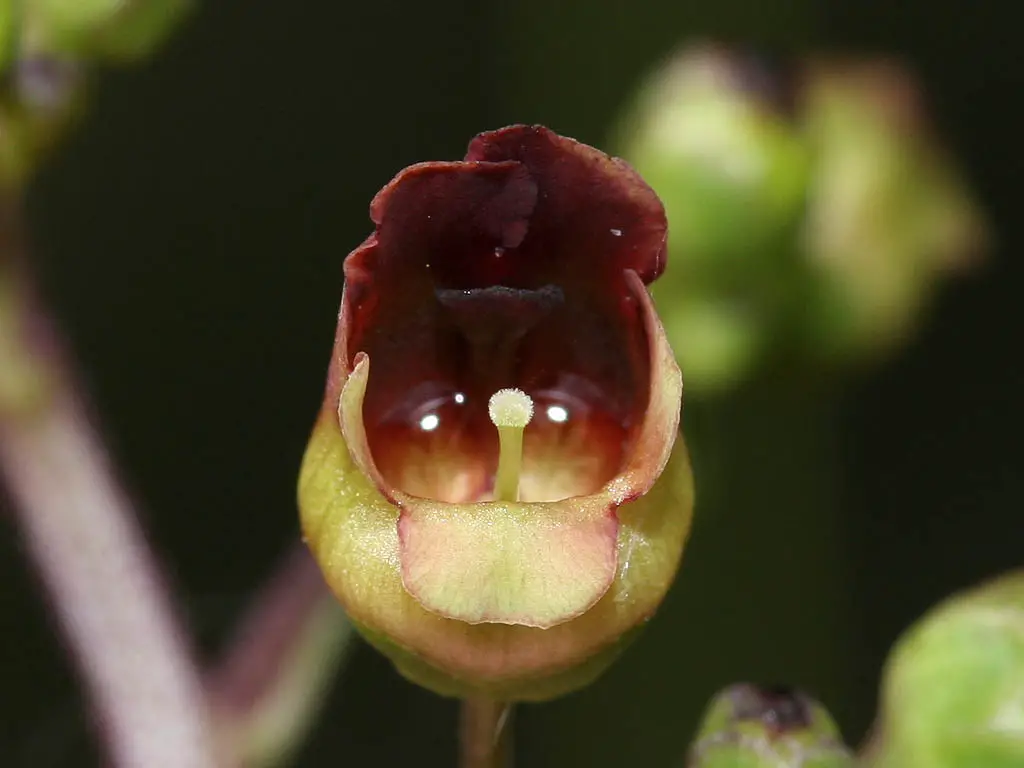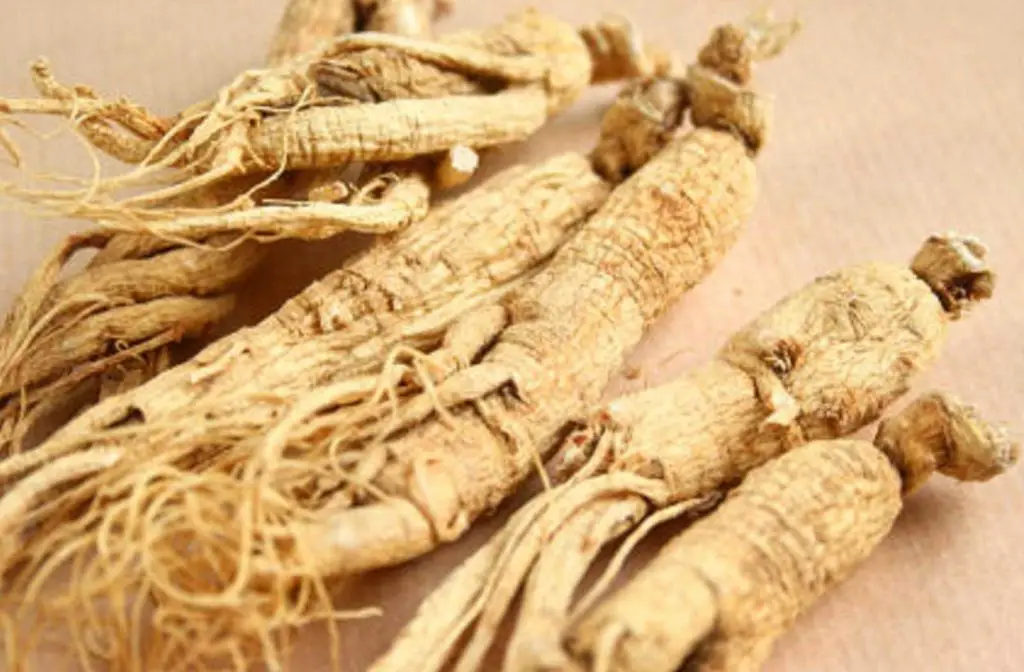What is bee pollen?
Bee pollen, also known as ambrosia, is simply pollen packed together by honeybees to form pellets. When honey and bee secretions are added to bee pollen, it is referred to as bee bread. Bee bread is stored in brood cells of combs and acts as a major food source for young bees.
For honeybees, making bee pollen is a rather long and intricate process necessary to ensure the survival of the colony. In order to make bee pollen, worker bees must first collect a substantial quantity of pollen grains. Once a worker bee lands on a flower, it initiates the harvesting procedure by scraping the loosely attached pollen off the anthers of the flower and moistening the pollen with a dash of honey that it brought from the hive. It does this using its front limbs and mandibles. The bee also uses pollen combs (enlarged tarsal segments covered with thick bristles) located on its legs, to brush off excess pollen from its body. By skillfully contracting its auricles, the worker bee is able to push the collected pollen grains into its pollen baskets (concave regions surrounded by a fringe of long hairs) located on the outside of its tibias. The worker bee will continue doing this until its baskets are fully loaded. When the pollen baskets are filled up, the microscopic pollen grains will be compressed into a single granule known as bee pollen.
An interesting fact about bee pollen is that it cannot be perfectly re-engineered in a laboratory. Several chemical analyses have been conducted on natural bee pollen using state-of-the-art diagnostic equipment, but scientists have still not been able to identify some of the compounds present in bee pollen. When bees are fed bee pollen that has been synthesized in a lab environment, they die even though the bee pollen is nutritionally similar to natural bee pollen. As a result, researchers predict that bees add additional unknown compounds into bee pollen during its formation. These unidentifiable compounds may very well be the reason behind the medical marvels exhibited by bee pollen.
Another fascinating fact about bee pollen is that it takes a single bee, working eight hours a day, for an entire month to collect one teaspoon of bee pollen. Each teaspoon of bee pollen contains over 2 billion pollen grains. A single grain of bee pollen contains more than two million pollen grains.
Bee Pollen Uses
Bee pollen has all of the nutritional components necessary for sustaining life. The levels of essential elements present in bee pollen are remarkably higher compared to wheat germ and brewer’s yeast. Bee pollen has been scientifically proven to correct various nutritional deficiencies plaguing our present-day societies that consume nutritionally incomplete foods, often loaded with toxic chemicals.
Many cultures throughout the world use bee pollen for various purposes. Some of the common uses of bee pollen include;
- Preventing mild communicable diseases, such as the common cold
- Helping overcome mental retardation and other developmental problems in children
- Improving endurance and vitality
- Aiding recovery from chronic illness
- Weight gain during rehabilitation and recovery
- Curbing cravings and addictions
- Anti-cancer properties
Did you know? Bee Pollen is one of the most complete food sources in existence? Our Favorite = > https://t.co/aJrePiunmj
— MedicinalHerbals (@MedicinalHerbal) February 27, 2017
Bee Pollen Benefits
Bee pollen is a nutritionally complete food source. It contains many nutritional elements that lack in animal products like meat, eggs and milk. Bee pollen has a higher protein percentage than any animal product of equal weight.
Several medical reports have shown that bee pollen is nutritionally superior to common foods being consumed today. One such report by researchers at the Institute of Apiculture in Taranov, Russia states that bee pollen is the most nutrient dense natural food known to man. It has extremely high levels of vitamins, minerals, free amino acids, nucleic RNA (ribonucleic acid) and DNA (deoxyribonucleic acid). Bee pollen also contains high levels of rutin – a vital nutritional element responsible for maintaining healthy blood vessels.
Health concerns related to nutritional deficiencies are on the rise worldwide. Since bee pollen contains most of the essential nutrients needed by humans, it is utilised on a large scale as a nutritional supplement to combat various nutrient deficiencies.
Improved Physical Abilities
Many renowned naturalists and athletic coaches have attested to the wonderful benefits offered by bee pollen to athletes.
The British Sports Council conducted a research on the effects of bee pollen on the strength levels of athletes. The findings of the research showed a 40-50 percent increase in strength in the athletes taking bee pollen regularly. More astounding revelations came from the British Royal Society which reported height increases in adults who consume bee pollen on a regular basis.
Antii Lananaki, the coach of the Finnish track team that dominated the 1972 Summer Olympics held in Munich, West Germany commented that most of their athletes actually take bee pollen food supplements. Studies that they conducted on bee pollen indicate that it considerably boosts physical performance. He also added that none of their patients experienced any negative effects from taking bee pollen.
The late Alex Woodly, a coach/mentor for many Olympic gold-medal sprinters in the 1960’s-1970’s and a former head of the prestigious Philadelphia Pioneer Club was a true believer in the great benefits of bee pollen for athletes. He once said that bee pollen increases the strength and endurance of athletes by 25 percent with zero side effects. Unlike steroids and other artificial chemical substances that some athletes these days pump into their system, bee pollen is as natural as it gets- a true gift of vitality from Mother Nature.
Just like Woodly, famous German naturalist Francis Huber was a great proponent of the nutritive benefits of bee pollen. Huber used to refer to bee pollen as “The greatest body-builder on Earth.”
Immune Booster
According to a report entitled, “Comparative Studies Concerning Biochemical Characteristics of Beebread as Related to the Pollen Preserved in Honey” , bee pollen supplementation significantly enhances immune function. This report outlines the findings of research conducted by Dr. E. Palos, Z. Voiculescu, and C. Andrei of the Agronomic Institute, Faculty of Zootechnics Romania.
The results of the research are as follows:
Bee pollen supplementation was found to significantly increase level of blood lymphocytes, gamma globulins and proteins. Lymphocytes, also known as white blood cells act as the immune system’s “fighters”. Apart from being the body’s first line of defence against disease causing microbes, white blood cells also perform other duties like ridding the body of old, infected, mutated or cancerous cells and metabolic wastes. Gamma globulin is a protein synthesized in the blood. It plays a critical role in the body’s ability to ward off infection.
Antibiotic Properties
To date, experiments conducted on bee pollen have established that bee pollen has antibiotic properties that will inhibit the growth of some bacteria. These studies have specifically indicated that bee pollen is very effective against strains of salmonella and several other disease-causing agents.
Regulates Intestinal Function
Clinical studies have shown that bee pollen has a regulatory effect on intestinal function. This effect can be attributed to its high levels of cellulose and fiber, as well as the existence of antibiotic factors.
Balances Cholesterol
Researchers have reported that bee pollen has the ability to restore normal cholesterol and triglyceride levels in the body. When incorporated into the diet, bee pollen has been shown to increase the levels of high-density lipoproteins (HDL), while decreasing low-density lipoprotein (LDL) levels. Stabilization of blood serum cholesterol levels has also been observed.
Treats Cancer
“Delay in the Appearance of Palpable Mammary Tumours in C3H Mice Following the Ingestion of Pollinated Food”, a research article written by William Robinson, Ph.D. and published by the United States Department of Agriculture (USDA) in the Journal of the National Cancer Institute (NCI) in October 1948 suggests that bee pollen can actually be used in the treatment of cancer, specifically breast cancer.
In the article, Dr. Robinson clearly outlines all the experiments he carried out. The mice used in the research were bred in such a way that they would develop and subsequently die from mammary tumours. The age at which these mice developed tumours was between 18 to 57 weeks with an average appearance at 33 weeks. Tumour incidence in this strain of mice was 100%.
The mice were divided into two groups; one group was fed only normal mice food, while the other group was fed mice food mixed with bee pollen in the ratio of 1 part bee pollen to 10,000 parts food. Since low body weight can delay the development of tumours, keen attention was paid to the weight of the mice. The mice being fed pollinated food registered no decrease in weight. Instead, they actually showed a slight increase in weight, possibly due to the nutritional factor in bee pollen.
The results of Dr. Robinson were as follows:
The group of mice that was fed normal mice food, developed mammary tumours as anticipated- at an average age of 31.3 weeks, while the group of mice that was fed pollinated food exhibited delayed mammary tumour development- at an average age of 41.1 weeks. Moreover, seven mice in this group still remained tumour-free at 56-62 weeks of age, when the experiments were terminated.
Considering the fact that breast cancer is the second most common, newly-diagnosed cancer and second leading cause of cancer deaths among women in the United States, one would think that people would take this article seriously. Yet, the exact opposite of this has occurred. The scientific society has not even bothered to follow up on this promising line of research. Unfortunately, the National Cancer Institute has also simply discarded Dr. Robinson’s findings without any explanations.
More promising findings came from the University of Vienna, where Dr. Peter Hernuss, along with other researchers, carried out a study involving 25 women suffering from inoperable uterine cancer. All the women were treated with chemotherapy, since surgery was not an option. Some of these women were given bee pollen with their food, while others were given plain food without bee pollen. The women who received bee pollen supplementation rapidly exhibited an improvement in immune function, marked by increased levels of cancer-fighting cells. In addition to this, these women suffered less from the awful side effects of chemotherapy, such as nausea, insomnia and hair loss. The group of women who were not given bee pollen exhibited no comparable improvements.
Treatment of Infertility Problems
Bee pollen supplementation has been found to significantly improve ovarian function in women suffering from infertility. In women receiving bee pollen supplementation, an increased intensity of ovulation along with the ability of the ova to withstand the incubation period is observed in respect to the placebo group. For the best results, it is recommended for women to supplement with bee pollen in the ratio 2 parts per 100 of pollen and with the substitution of animal proteins with pollen in a proportion of 5 parts per 100.
Treatment of Anemia
Various studies involving lab animals have proven the effectiveness of bee pollen when it comes to treating anemia. The ingestion of bee pollen by anemic patients has been shown to considerably increase their levels of hemoglobin (the iron-rich oxygen-transport metalloprotein in the red blood cells). A significant increase in both lymphocytes (white blood cells) and erythrocytes (red blood cells) levels has also been observed in the patients.
Weight Control
Whenever the subject of weight control is brought up, many people tend to focus on weight loss rather than weight gain. This is probably because of the numerous health problems associated with being overweight. However, being underweight can still be as detrimental as being overweight. Just like there is a healthy maximum weight limit, there is also a healthy minimum weight limit. Some of the health issues associated with being underweight include; inhibited growth and development (especially in children and teens that are still actively growing), fragile bones, weakened immune system, anemia, fertility issues and hair loss.
So, how can one stay within the confines of a healthy weight limit? For one, incorporating a healthy diet into your daily regimen is a good way to start. With a diet consisting of all the macro and micro nutrients in their appropriate amounts, both weight gain and weight loss are pretty much achievable. But, does such a diet really exist? Why, of course it does. However, such a diet can be pretty expensive for most people and rather cumbersome to maintain. The only cost-effective and simple alternative comes through the use of bee pollen. This food works miracles when it comes to weight-stabilization or weight-control.
In weight-loss programs, bee pollen activates the metabolic processes responsible for speeding up caloric burn in the body. Given that bee pollen is one of the most nutrient dense foods in the world and it contains only ninety calories per ounce, makes it an exceptional weight loss food.
Lecithins (which are phospholipids, composed of phosphoric acid with glycerol, choline or other fatty acids usually glycolipids or triglyceride) play an important role in the lowering of body fat percentage. Since lecithin is a natural fat emulsifier, consuming more of it can in fact inhibit fat storage. Bee pollen contains about 15% lecithin by volume. This makes it the perfect “fat burner.”
Bee pollen contains significant amounts of the essential amino acid L-Phenylalanine which is a known appetite suppressant. L-Phenylalanine works by stimulating the release of cholecystokinin- a gut hormone which signals the brain to slow down digestion creating a sense satiety shortly after eating. Bee pollen also curbs cravings by filling in nutritional gaps that may exist in your diet.
In a weight-gain program, bee pollen can be used as a nutritional supplement. According to several studies, an average bee pollen sample roughly contains 20% proteins, 25% carbohydrates, 5% fatty acids, and the remaining 50% is composed of minerals, fibre, vitamins, enzymes and water.
Health and Beauty
Beauty can be seen as directly correlated to health. Our personal health involves what we put in and on our bodies. After all you are what you eat! Eating a healthy diet and using natural skin products will go a long way in determining how you look. In today’s weight conscious society, having a beautiful face is just not enough. Physique plays a large role in your overall appearance. When bee pollen is included into the daily diet, it not only provides you with essential nutrients to keep your skin healthy and radiant, but it also aids in safe weight control. Bee pollen can also be blended with other natural ingredients to make relatively inexpensive body lotions and creams for adding that extra touch of radiance to every inch of the outside of your body.
Dr. Lars-Erik Essen, a renowned dermatologist from Helsingborg, Sweden and a pioneer in the field of bee pollen skin care products has successfully treated many of his patients suffering from various skin conditions using bee pollen skin products. Dr. Essen argues that bee pollen exerts amazing effects on the skin via transcutaneous nutrition, primarily, because it contains a high concentration of RNA and DNA as well as antibiotic factors. Some of these effects include preventing premature aging of skin cells, stimulation of blood flow to the skin, activating growth of new skin tissue and protection against dehydration. All these positive effects make the skin become smoother, healthier and less prone to wrinkles.
Two Russian scientists, Professors N. Mankovsky and D. G. Chebotarev carried out research and proved that bee pollen actually stimulates skin cell renewal. The two scientists asserted that the rejuvenation of skin and body cells can be encouraged by the interaction of the elements present in bee pollen such as microelements, poly-vitamins, enzymes, amino acids and hormones. The professors went on to refer to the properties of bee pollen as being vital to a form of internal and external rejuvenation at the cellular level.
Allergy Treatment
Over the ages, bee pollen has been used by many cultures as a remedy for allergies and hay fever. But, given the fact that pollen is a common allergen, many people would consider it foolish to use it as remedy against allergies. Nonetheless, bee pollen still works! So, how does this golden dust work?
To understand the concept behind the workings of bee pollen, it is imperative that we first know how immunization works. This is because their working principles are more or less similar. During immunization, an individual is given an attenuated (weakened) form of the disease causing micro-organism so as to ‘trick’ the recipient’s immune system into thinking that the body is under attack. In response to this false alarm, the immune system will produce antibodies to counteract the infection. The immune system will then keep a memory of this attack enabling it to work quickly and more efficiently during future attacks by similar microbes.
In the treatment of allergies using bee pollen, a technique similar to immunization is used. This technique is known as desensitization. Desensitization was developed by scholars at St. Mary’s Hospital Medical School in London during the early 19th century. The treatment involves administering small doses of the allergen- which in this case is bee pollen- to the patient so as to elicit an immune response that will eliminate the allergic reaction. After the elimination of the allergic reaction, the immune system will record the attack and make more antibodies to counter a similar allergic reaction in the future. For the treatment to work, the patient must be repeatedly given small doses of the allergen over a certain period of time, usually not less than 6 weeks before the beginning of the season and throughout the season.
Leo Conway MD., an early pioneer in the field of allergies from Denver, Colorado, treated his patients of various illnesses using bee pollen. Given that oral feeding of pollen for treatment of various ailments was first perfected in his lab, amazing results were obtained. Dr. Conway reported that ninety-four percent of all his allergy patients were completely cured of their allergies. All the patients who had taken bee pollen for three years stayed allergy-free regardless of their lifestyles. Even the remaining six percent, most of who failed to follow the prescription correctly, exhibited some sense of well-being after the treatment. Dr. Conway asserted that control has been achieved in 100 percent of his previous cases and the field is ever-growing. He also added that no ill side effects were recorded from the uses of bee pollen. Some of the illnesses that Dr. Conway has successfully treated include hay fever, ulcers of the digestive tract, pollen-induced asthma, bronchitis, sinusitis, colitis, migraine headaches and urinary tract disorders.
Bee Pollen Dosage
Appropriate bee pollen dosage will depend on various factors- the form of bee pollen you are planning on taking (capsules or granules), your reasons for taking bee pollen, your past experience using bee pollen, your medical history etc. If you are trying out bee pollen for the first time, it is always important to consult your doctor first.
Most of the bee pollen sold in health stores will come with guidelines on how to use it. If you happen to buy bee pollen that has no direction on how it should be taken, you can always consult a local herbalist or the person who sold it to you. But, be careful who you ask for advice as some people may mislead you knowingly or unknowingly.
The good news, however, is that there are no known Bee Pollen overdoses. Still, it is important to start small and work up to the amount that works for you as some people may be allergic to Bee Pollen.
Noomadics recommended dosage: There is no scientifically proven dosage for Bee Pollen. Some people recommend anywhere from 500mg to 2000mg of Bee Pollen per day, but there is no proof of the effects this has. It is recommended you start with a low dosage and increase it based on how you feel.
Cautions
Bee Pollen should only be taken with the consultation of your doctor. If you are allergic to bee’s or think you are allergic to bee’s Noomadics would strongly advise you against taking Bee Pollen.
Where to Buy Bee Pollen?
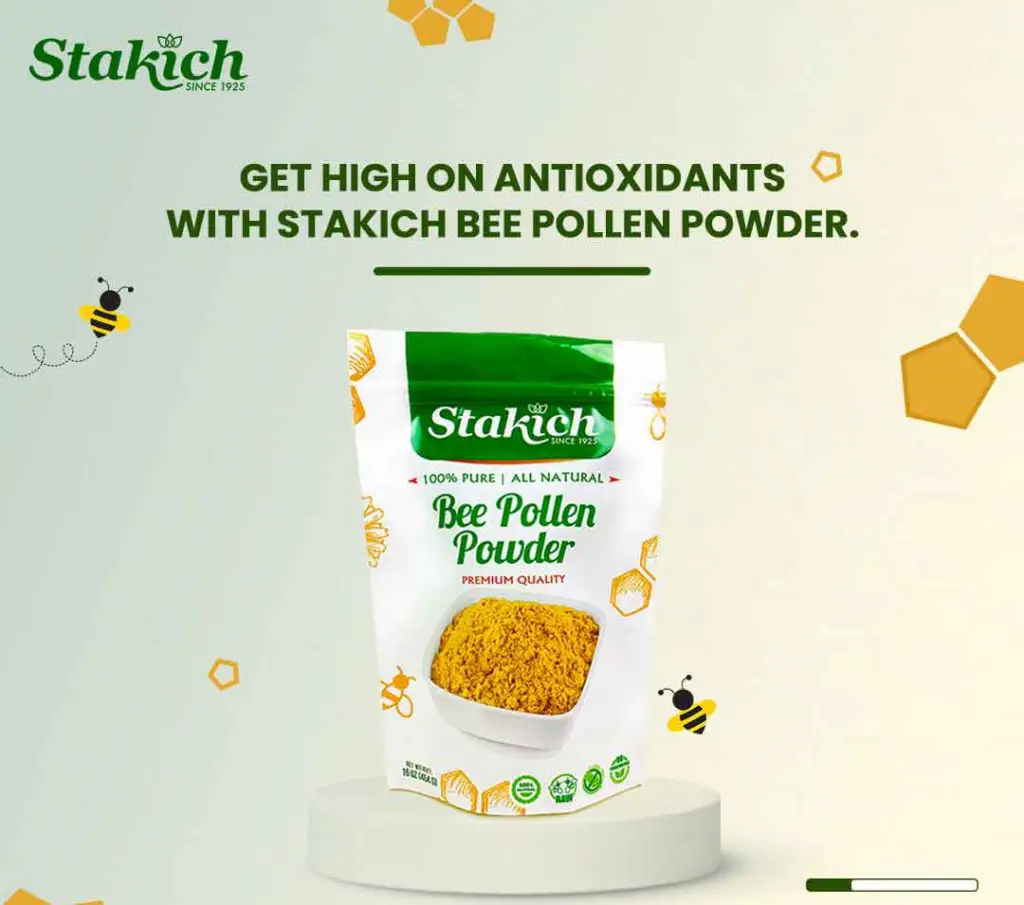
Bee pollen is available at many health food stores and online shopping sites, so you won’t have trouble finding it. Recently, it has been discovered that some unscrupulous individuals are hoaxing unwary buyers by selling them something other than bee pollen. Because of this, you should always buy bee pollen from genuine sellers. Genuine sellers are those that have been licenced by the relevant authorities to sell bee pollen.
References:
http://www.ncbi.nlm.nih.gov/pmc/articles/PMC4377380/
http://www.ncbi.nlm.nih.gov/pmc/articles/PMC4276980/
http://www.sciencedirect.com/science/article/pii/S0147651308001796
http://www.hindawi.com/journals/ecam/2015/297425/

